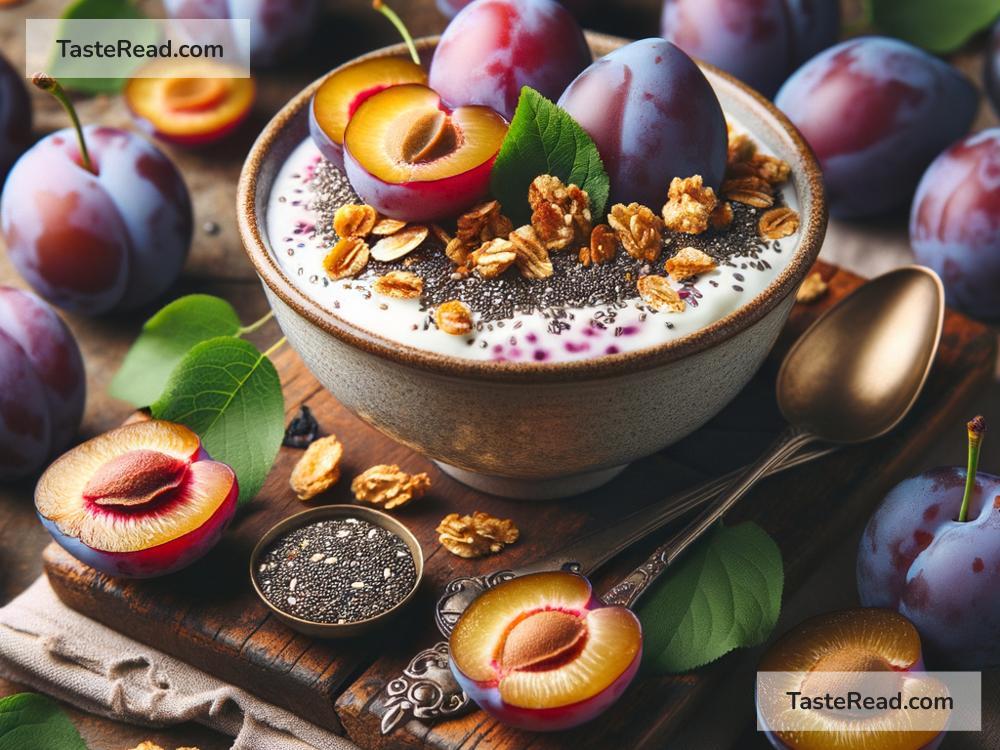Can Plums Help Improve Digestion and Gut Health?
For many people, maintaining good digestion and gut health is vital for overall well-being. Our gut is responsible for breaking down food, absorbing nutrients, and eliminating waste, making it a key player in keeping us healthy. In recent years, certain foods have gained attention for their gut-friendly benefits, and one such fruit is the humble plum. But can eating plums really help improve digestion and gut health? Let’s explore!
What Are Plums?
Plums are small, juicy, and colorful fruits that come in shades of purple, red, and yellow. They’re sweet and tangy, making them a delicious addition to snacks, desserts, or smoothies. Plums are rich in vitamins, minerals, antioxidants, and fiber, all of which contribute to their health benefits.
Plums can also be dried to make prunes, which have long been famous as a natural remedy for constipation. Both fresh plums and prunes are packed with nutrients and compounds that support digestion and gut function.
Key Nutrients in Plums That Help Digestion
Plums are loaded with beneficial nutrients, but when it comes to gut health, a few stand out:
-
Fiber: Fiber is essential for healthy digestion, and plums contain a good amount of it. There are two types of fiber in plums: soluble and insoluble. Soluble fiber draws water into the digestive system, softening stools and promoting regular bowel movements. Insoluble fiber adds bulk to stools and helps them pass through the intestines more easily.
-
Sorbitol: Plums contain sorbitol, a natural sugar alcohol that works as a mild laxative. Sorbitol draws water into the intestines, helping prevent constipation and promoting smoother digestion.
-
Antioxidants: Plums are rich in antioxidants, particularly polyphenols. These compounds help reduce inflammation in the gut, which can improve overall digestive health. Antioxidants also protect gut cells from damage caused by free radicals, supporting a healthy gut lining.
-
Vitamin C: This vitamin is abundant in plums and plays a role in keeping your digestive system functioning well. It helps the body absorb iron, promotes the health of gut tissues, and aids in producing digestive enzymes.
How Plums Improve Digestion
Eating plums can benefit your digestion in multiple ways. Here’s how:
-
Preventing Constipation: The fiber and sorbitol in plums and prunes work together to keep your digestive system moving. They speed up food’s journey through the intestines and help soften stools, easing discomfort caused by constipation. If you’ve ever had a bloated stomach or struggled with bowel movement, eating plums could be a natural way to find relief.
-
Regulating Gut Bacteria: A healthy gut depends on having a balance of good bacteria, also known as the gut microbiome. Plums contain prebiotic fiber, which feeds beneficial bacteria in the gut. These bacteria help with digestion, immune function, and overall health. By promoting the growth of good bacteria, plums create a supportive environment for your digestive system.
-
Reducing Inflammation: Poor gut health is often linked to inflammation caused by processed foods, stress, or unhealthy lifestyle habits. The antioxidants in plums help lower inflammation in the gut, reducing discomfort and improving digestion. A healthier gut leads to better nutrient absorption and overall energy levels.
Fresh Plums vs. Prunes: Which is Better?
Both fresh plums and prunes have gut-friendly benefits, but they’re slightly different. Prunes (dried plums) have a higher concentration of fiber and sorbitol, making them especially effective for relieving constipation. If you’re looking for quick results and improved bowel movements, prunes might be the better option.
Fresh plums, on the other hand, are lower in calories and sugar compared to prunes. They’re a great choice if you want a hydrating and refreshing fruit that supports digestion while being lighter on the stomach.
Ultimately, both options are great for your gut—choose the one that best fits your cravings and needs.
How to Add Plums to Your Diet
Adding plums to your daily routine is easy! Here are a few ways to enjoy them:
- Snack: Eat fresh plums as a quick and healthy snack for a sweet fix.
- Salads: Slice plums and toss them into salads for a burst of flavor.
- Smoothies: Blend plums into smoothies for a gut-friendly drink.
- Breakfast: Sprinkle chopped plums or prunes onto oatmeal or yogurt.
- Desserts: Use plums in baked goods like tarts or muffins.
Remember, moderation is key. While plums are great for digestion, eating too many can cause bloating or diarrhea due to their fiber and sorbitol content.
The Bigger Picture of Gut Health
While plums are a fantastic addition to support digestion, improving gut health involves more than eating one fruit. Drinking plenty of water, eating a variety of fiber-rich foods, exercising regularly, and managing stress are all crucial for a healthy gut.
Final Thoughts
Plums are a delicious and natural way to boost your digestive health. Their fiber, sorbitol, antioxidants, and ability to support healthy gut bacteria make them an excellent choice for improving bowel movements and overall gut function. Whether you choose fresh plums or prunes, they offer a range of gut-friendly benefits that can help you feel better and stay energized.
So next time you’re at the grocery store, consider picking up some juicy plums. By making this small change to your diet, you’ll take a big step toward a happier and healthier gut!


